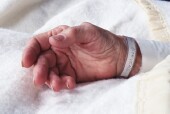
TUESDAY, Nov. 16 (HealthDay News) — Hospital care-related problems contribute to the deaths of about 15,000 Medicare patients each month, according to a new federal government study.
One in seven patients suffers harm from hospital care, including infections, bed sores and excessive bleeding from blood-thinning drugs, said researchers who analyzed data on 780 Medicare patients discharged from hospitals in October 2008, USA Today reported.
That works out to about 134,000 of the estimated one million Medicare patients discharged that month, said the Office of Inspector General, Department of Health and Human Services.
Temporary harm occurred in another one in seven patients whose care-related problems were detected in time and corrected.
“Reducing the incidence of adverse events in hospitals is a critical component of efforts to improve patient safety and quality care,” the inspector general wrote.
Of the 780 cases studied, which were considered a nationally representative sample, 12 patients died of care-related problems. Blood-thinning medications were implicated in five deaths, and insulin mismanagement and over-sedation played a role in two other deaths, USA Today reported.
The study findings “tell us exactly what some of us have been afraid of, that we have not made much progress,” Arthur Levin, director of the independent Center for Medical Consumers, told USA Today. “What more do we have to do to make sure that sick people can rest assured that they’re not going to be harmed by the care they’re getting?”
Medical mistakes are “an enormous public health problem,” agreed Peter Pronovost of Johns Hopkins University, co-author of the book Safe Patients, Smart Hospitals.
“We spend two pennies trying to deliver safe health care for every dollar we spent trying to develop new genes and new drugs,” Pronovost told USA Today. “We have to invest in the science of health care delivery.”
The study is the first designed to better understand adverse events in hospitals, the inspector general’s office said.
Medicare, a government-funded health insurance program for the elderly and anyone with kidney failure, covers about 47 million Americans, USA Today said.
More information
The U.S. Agency for Healthcare Research and Quality outlines what patients can do to ensure quality care.

